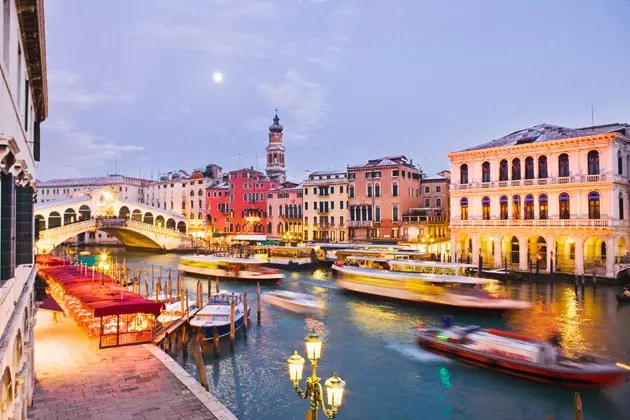
More than 20 million tourists visit Venice each year
The (few) residents of the center of Venice are fed up with what they call "take away" tourists. They are those who only find out where they have been once they print or develop the photos that they have had them all the trip with their nose glued to the camera, without enjoying the environment with your own eyes . The locals miss a more humane type of tourism in their city, which they say they have known in the past. And they believe that those of us who visit her have a small part to blame.
At least that is the story told by the documentary Das Venedig Prinzip (The Venice Syndrome), which has just been screened at the Karlovy Vary Film Festival. The director of this documentary, Andreas Pichler, uses Venice as a symbol in which to reflect on a large scale a change that is already taking place in many other cities**.** There are fewer and fewer residents there. Currently, around 58,000 remain and it is estimated that by 2030 there will be none of them left in the center. The film is a tribute to this race in danger of extinction: the Venetian who does not give up his place of origin, an enclave where neighborhood life has collapsed due to the effect of the tourist industry.
However, anyone who has spent more than 24 hours in the Italian city will have been able to verify that very close to the tourist hubbub of San Marcos almost phantasmagorical areas can be found without problems, for example in Giardini . Also in La Giudecca and its islands that remain deserted (except for some hotels near the vaporetto stop) . A little further, near Burano, the island of Torcello is directly abandoned.
SEQUENCE 1
Two old women greet each other and talk briefly on their way to the shop in a typical Venetian street when the silhouette of a ship of monstrous dimensions appears in the background. Hundreds of tourists are getting off that cruise ship like ants. A beggar is waiting for them with a piece of cardboard that reads: "I'm Venetian, but I don't have a hotel, or a gondola, or a souvenir shop."
SEQUENCE 2
With the same irony, the elderly Tuddy Samartini complains that younger generations like her son's cannot live where they were born. "They flee from a destiny that forces them to sell glass figures sitting on a sidewalk in a square," he says. . Even she, descended from the Venetian nobility, has been forced to rent part of her home on the Via Nuova to some of the city's visitors, more than 20 million a year. She does it so she doesn't have to leave what she considers to be one of the few areas that keeps reminding her of the past.
SEQUENCE 3
Giorgio enjoyed the city's popularity when he worked as a gondolier half a century ago. It was the time when Americans discovered Venice to be fascinated by the place and when Joan Crawford was able to walk on the canals. In the bar where he goes every afternoon to have his vermouth he regrets that tourism today is so hasty, with sporadic visits of just one day and so far from those he knew.
But what fault do we have, poor tourists, for not being able to enjoy longer stays? Little bit , except not to treat the buskers like human jukeboxes, as we are asked to do in the film. And those who can afford to spend more time in the city, however, prefer to invest it in extravagant costume parties in palazzos that end up looking like strip tease venues.
People from Venice are aware that the increase in prices in Venice is due to the growing sale of public space to private institutions (one of the most recent a huge post office that has been in the hands of the Benetton group). Public administrations disappear from the city, as if it were no longer part of Italy, and residents follow behind, due to a lack of infrastructure that the private sector does not guarantee.
SEQUENCE 4
Flavio is a transporter who practically lives on a ship. In his fifty years of life he has made hundreds of moves and he has seen how the palaces became luxury hotels and the apartments of his neighbors in Bed & Breakfast . The next move is, again, his: he is unable to face the rent increase of what has been his house. In the house across the street, his neighbors are barely visible. They are French and only use the house at Christmas and when a relevant cultural event takes place. The good thing, Flavio always optimistic tells himself, is that in his house in the new area of the city he will find the neighbors who have been disappearing in recent years.
